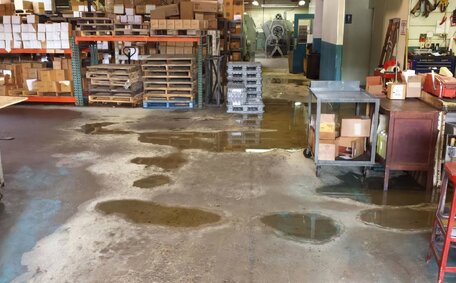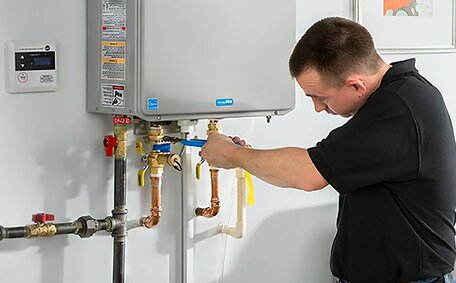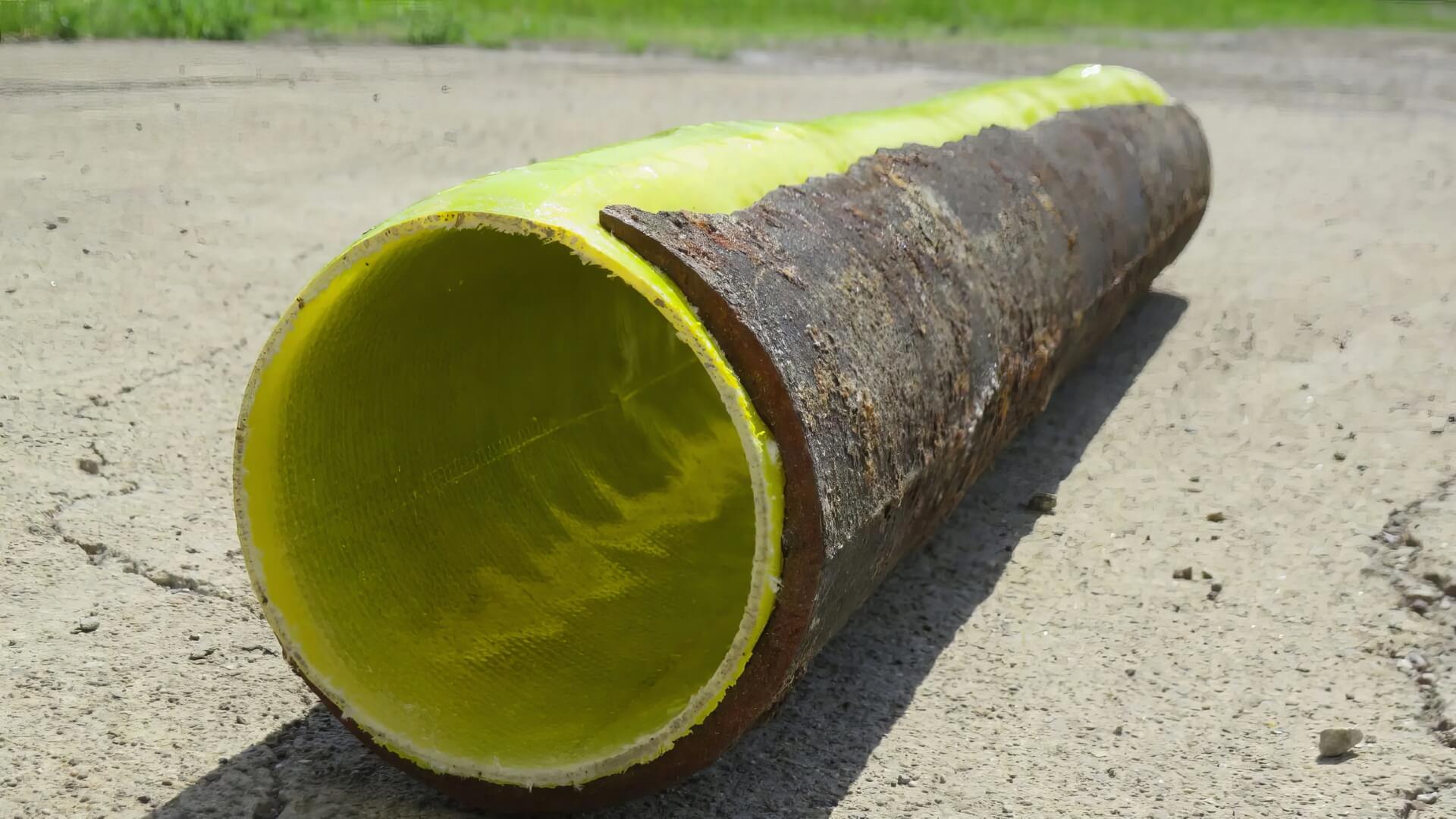
How To Fix Water Heater Issues
Can’t get hot water from your water heater? Try troubleshooting by checking the power supply, thermostat, heating elements and more. Call a pro plumber for repairs.
Read MoreIn a plumbing emergency, it’s essential to remain composed and promptly determine the extent and origin of the problem, whether it’s a burst pipe or sewage backup.
Check all water fixtures, drains, appliances, and pipes to locate the leak or overflow’s point of origin — the central issue to address efficiently.
When you suspect a gas leak, indicated by unusual smells or sounds from appliances, immediately shut off the gas supply and evacuate the area.
After pinpointing the issue, such as burst water pipes, immediately shut off the water supply and call a 24-hour emergency plumber.
In any plumbing emergency, your safety is the top priority. Avoid handling electrical switches.
Turn off electricity where water is present to prevent electrocution. In the case of gas leaks, stay away from the property until cleared by emergency services.
Protect yourself from health hazards by avoiding areas with sewage backup. Raw sewage exposure can lead to illness and severely harm your property. Seal off and evacuate any areas at risk until professional cleaning occurs.
Limit entry to affected areas, keep kids and pets away, and promptly contact an emergency plumber. Ensure safety and secure the plumbing system before taking further action. After evacuation, seek assistance from experienced plumbing professionals.
Immediately turning the main water valve clockwise is crucial to restricting damage in a plumbing emergency.
An emergency plumbing kit enables rapid response to leaks before professional help arrives.
Stock your kit with items such as pipe clamps to curb leaks temporarily, place towels to absorb spillage, and use a bucket to collect leaking water, mitigating damage until the plumber arrives.
For burst pipes, immediately turn off the water at fixture-specific shutoff valves when possible. Use rubber or metal clamps to temporarily halt the leak, while maintaining water supply to the rest of your home.
If a gas leak is suspected, shut off the gas at the main valve, evacuate immediately, and contact the fire department and gas utility company.
Immediate response is crucial to reduce property damage in plumbing emergencies. Homeowners should familiarise themselves with shutoff valve locations for rapid intervention.
Attempting makeshift repairs on burst pipes or sewer lines can impair water quality, lead to flooding, and can result in expensive repairs down the line. Unattended sewage issues can lead to water contamination and pose significant health risks. Only professional-grade equipment should be used for these jobs.
Gas leaks can be fatal if improperly addressed. To address plumbing and gas concerns appropriately, it’s sometimes necessary to turn off gas supply and consult a licensed gas plumber. If you smell gas or hear unusual noises from your gas metre, turn off the gas immediately, evacuate and call emergency services.
Engaging a dependable plumbing service like Baulkham Hills Plumbing ensures prompt assistance in urgent situations. Have their contact information on hand for rapid response to emergency plumbing needs.
While minor issues may allow for DIY fixes, it is wise to seek a professional for major problems to prevent injury, protect your property, and avoid costly repairs.
When facing minor issues with your hot water system, quick fixes can temporarily stop leaks and damage until a professional plumber arrives. Simple solutions include using duct tape or pipe repair putty to patch cracks in pipes, or silicone sealant for a short-term fix on leaks in fixtures and joints.
Use duct tape to temporarily secure burst hoses or cracked pipes. To plug small holes in pipes, apply pipe repair putty directly into the breach.
Temporarily seal leaky joints near sinks, bathtubs, and showers with waterproof silicone sealant. Use wedges or shims to adjust pipes and reduce leaks at connections.
Quick fixes are temporary; contact a specialist plumber promptly for durable solutions and to prevent further harm.
Preventative maintenance can dramatically reduce plumbing emergency risks. Regular inspections and proactive maintenance, such as monthly pipe checks and drain cleaning, can arrest minor issues before they intensify.
Routine checks under sinks and water heaters can uncover leaks and pipe deterioration. Ensure the shutoff valves are operational for emergencies.
Inspect your toilet tanks and fixtures meticulously for any signs of cracks or leaks. Test sump pumps and clear accumulated debris from pump wells.
Annual maintenance for water heaters and plumbing with a qualified plumber can prevent failures and avoid future issues. Proactively replacing worn components can avert crises.
Install leak detectors near appliances for early issue identification, thus averting extensive repairs that major leaks would necessitate.
Proactive plumbing maintenance can alleviate the disruption of unforeseen issues, ensuring that some repairs can await professional evaluation.
Having the right tools can save time and money during plumbing emergencies. Essential emergency toolkit items include:
With essential tools, you can manage minor leaks on the spot. A well-stocked kit, complemented by professional aid, can protect your finances and home from damage in emergencies.
Be aware of your emergency kit’s location and restock any used items promptly.
Have the contact details for an emergency plumber, insurance, hardware store, and utilities ready for additional support. Preparedness is crucial for efficiently addressing plumbing disasters.
Familiarity with your main water shutoff valve’s location and operation is essential for controlling water flow into your home during a plumbing mishap.
Look for a large knob or lever.
The main shutoff valve is located where your water line enters your home, often by the front hose bib, water meter, or water heater, either on a riser pipe or wall-mounted.
Verify the valve’s operability to cut off and restore your home’s water supply. Teach household members its location and usage to prevent significant damage in emergencies.
Knowing how to shut off your valve is vital for handling water emergencies. Turn it off immediately during major leaks or busts, during repairs, or if the pipes risk freezing.
Quickly shutting off the main water supply curtails further overflow.
Keep the area around your main water valve clear for quick access. Have tools like a wrench ready to operate it during emergencies, as advance knowledge facilitates rapid response.
For severe water damage, document everything through photos or videos and list all affected items to support your insurance claim.
Contact your insurer promptly to initiate a claim, detailing the cause, extent of damage, and emergency measures taken, including invoices from plumbers or remediation services.
Retain damaged items for assessment, supporting your claim with receipts and valuations. Mitigate further damage while collaborating with your insurer.
Conduct temporary repairs if essential, and refrain from non-emergency work until the insurer approves, ensuring coverage.
Collaborate and communicate efficiently with your insurance agent to expedite the claims process and secure appropriate reimbursement for your losses.
Stay composed and act immediately to limit damage during a plumbing emergency, as panic can exacerbate the situation.
Quickly assess the problem and risks involved, as fast response can curb escalation.
Should gas leaks or electrical hazards be present, prioritize safety and immediately call the relevant emergency services.
Manage leaks with a plumbing kit’s clamps, tape, and sealant as temporary measures but remember to promptly seek professional plumbing assistance.
Document damage for insurance purposes, but prioritize controlling the situation. The sooner you manage the water and secure hazards, the fewer repairs will be required.
Remain vigilant and prepared to act decisively during a plumbing emergency.
Prepared and quick, informed measures can manage plumbing emergencies effectively. Save your local emergency plumber’s number for immediate response and take the necessary steps to protect your property without panicking.
Can’t get hot water from your water heater? Try troubleshooting by checking the power supply, thermostat, heating elements and more. Call a pro plumber for repairs.
Read MoreCloudy or milky hot water coming from your taps is generally harmless and caused by trapped air bubbles in the water. Simply running the tap for a little while will usually clear up the water. If the cloudiness persists, it could be caused by sediment buildup or issues with your pipes.
Read MorePipe relining involves inserting a tube inside damaged pipes to repair cracks and leaks without digging. This trenchless method may allow pipes and plumbing fixtures to be relocated during bathroom renovations. Contact our expert plumbers to understand if pipe relining can reposition your pipes and fixtures.
Read MoreBaulkham Hills, 2153 NSW
We will call back as soon as possible.




